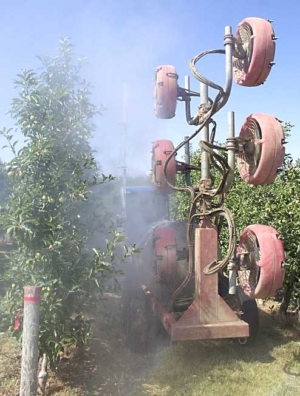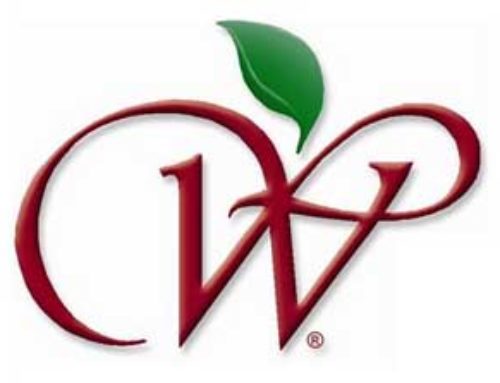
Cornell researcher Andrew Landers demonstrates a precision sprayer at the IFTA 2016 Study Tour in New York. (Shannon Dininny/Good Fruit Grower)
Front and center at the International Fruit Tree Association’s 2016 Study Tour: mechanization.
Mechanical pruning and hedging. Platforms. Precision sprayers. All were on display for the roughly 275 attendees of the New York tour July 19-21 — and all highlighted changes ahead for an industry increasingly relying on high-tech wizardry to grow crops and bring them to market.
Also key: How these mechanical aids have fit into different horticultural systems.
At Wafler Farms, the focus centered on not just mechanization, but a systems approach to managing both the crop and the labor.
A self-propelled mobile platform and automated bin loader designed by Paul Wafler has eliminated the use of ladders in the tipped tall spindle orchard, he said, and is used for every task in the orchard except mowing and spraying.
Scott Van DeWalle of Van DeWalle Farms showed off a multi-row platform used almost every day in his tall spindle orchard — for pruning, hand thinning and tying trees — except during harvest.
Tom and Alison DeMarree shared tips for growing new varieties, including having one person who’s interested in doing new variety trials oversee those efforts.
“Do some research. Read the literature. Find out who’s been growing it and the problems they’ve had,” Alison DeMarree said.
Those were just a few of the stops. The Cornell University Field Day at the Geneva Experiment Station included updates on the latest research on controlling bitter pit in Honeycrisp, fire blight management, apple breeding and cherry rootstock trials, among other things.
Cornell University Extension entomologist Art Agnello shared information about efforts to control black stem borers, an issue highlighted in the August issue of Good Fruit Grower.
Stay tuned for more from the IFTA 2016 Study Tour in future issues.






Leave A Comment